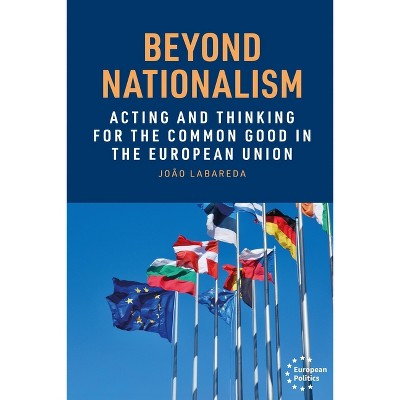Sponsored

Peace and the Politics of Memory - (New Approaches to Conflict Analysis) (Hardcover)
In Stock
Sponsored
About this item
Highlights
- The book explores how the politics of memory impacts peace in societies transitioning from a violent past.
- About the Author: Johanna Mannergren is Associate Professor in Peace and Development Research in the School of Social Sciences at Södertörn University.
- 256 Pages
- Political Science, Comparative Politics
- Series Name: New Approaches to Conflict Analysis
Description
About the Book
The book explores how the politics of memory impacts peace in societies transitioning from a violent past.
Book Synopsis
The book explores how the politics of memory impacts peace in societies transitioning from a violent past. It finds that three elements of memory politics - inclusivity, pluralism, and dignity - play a key role for a just peace.From the Back Cover
'This book offers much needed SANE framework to examine the complex relationship between memory and peace in societies that are in transition from war to peace. The authors draw from their various rich research experiences to provide powerful comparative analysis. The book makes an innovative contribution to interdisciplinary debates on memory and peace at a moment when many societies in our world are negotiating memories of their pasts while searching for durable peace.' David Mwambari, Associate Professor, KU Leuven University
'This volume is a milestone that traverses the frontiers of existing thinking about the possibilities of everyday peacemaking, as well as the social and political terms of the wider, deeper, more complex forms that are clearly necessary. It helps us better understand the deep entanglement of contemporary conflict and violence, as well as new avenues to make peace.' Oliver P. Richmond, Professor, University of Manchester
'This is a book needed more than ever today witnessing how the power of the past, the politics of memory (ies) and unaddressed grievances flare up new crises and insecurities and conflicts.' Maria Hadjipavlou, retired Associate Professor, University of Cyprus
Peace and the politics of memory explores how the politics of memory impacts peace in societies transitioning from a violent past. It finds that three elements of memory politics - inclusivity, pluralism, and dignity - play a key role in the construction of a just peace. The book generates original and important findings on how memory politics affects the quality of peace and contributes new and timely knowledge about societies that grapple with the painful legacies of the past.
Review Quotes
'The five authors each with their expertise and through collaboration have produced a ground-breaking contribution to Memory Studies, Conflict and Peace Studies and to feminist methodology. These different area studies are in conversation with each other as are the five cases discussed in the book (Cyprus, Bosnia and Herzegovina, Rwanda, South Africa and Cambodia). Although each have a different history(ies) they all share a past filled with the dynamics of conflict (internal and external) with grievances, violations of dignity, humiliation, human and material losses as well as selectively constructing a politics of memory (and forgetting), often used as a political strategy to either sustain the conflict or to contribute to complex durable peace processes and justice. The authors discuss memory (which is not cohesive but fluid too) by integrating the concept of the 'political power of memory' showing how different agents can use this power to define the past so as to legitimise their positions and influence the quality of the future peace processes. The authors strongly believe these interactions should be grown locally and owned by the people-a critique of top down liberal peace . The use of SANE (Sites, Agents, Narratives, Events), an inclusive theoretical framework of analysis which the authors developed and used in each of the case studies, can be applied to many other similar post-conflict societies, thus unpacking both the concepts of memory politics-mnemonic formations - and the concept of peace (beyond the binary negative and positive peace). The authors understand peace(s) (in the plural) as dynamic processes continually 'becoming', thus recognising the different ways in which peace manifests itself in conflict-affected societies in their everyday life characterized by plurality, dignity and inclusivity.
This is a book needed more than ever today witnessing how the power of the past, the politics of memory (ies) and unaddressed grievances flare up new crises and insecurities and conflicts.'
Maria Hadjipavlou, retired Associate Professor, Conflict Resolution and Gender Studies, University of Cyprus., and author of 'Women and Change in Cyprus: Feminisms, Gender in Conflict" I.B.Tauris 2010
Oliver P. Richmond, Professor, University of Manchester 'This book offers much needed SANE framework to examine the complex relationship between memory and peace in societies that are in transition from war to peace. The authors draw from their various rich research experiences to provide powerful comparative analysis of five complex that are experiencing the processes of memorialization and the search for durable peace. The book makes an innovative contribution to interdiscip
About the Author
Johanna Mannergren is Associate Professor in Peace and Development Research in the School of Social Sciences at Södertörn University.
Annika Björkdahl is Professor of Political Science in the Department of Political Science at Lund University.
Susanne Buckley-Zistel is Professor of Peace and Conflict Studies at the Center for Conflict Studies, Philipps University Marburg.
Stefanie Kappler is Professor in Conflict Resolution and Peacebuilding at the School of Government and International Affairs / Durham Global Security Institute, Durham University.
Timothy Williams is Junior Professor of Insecurity and Social Order in the Institute for Political Science Department of Social Sciences and Public Affairs at Bundeswehr University Munich.
Shipping details
Return details
Trending Non-Fiction











